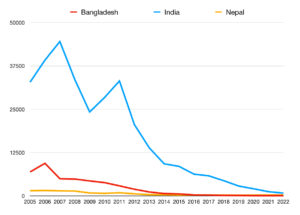
WHO framework to eradicate visceral leishmaniasis (VL), an epidemic most outstanding in East Africa, was launched Thursday.
It might probably play an necessary position in eliminating VL as a public well being drawback by 2030: a aim key international locations of the East African area dedicated to in final 12 months’s Nairobi Declaration.
“The VL elimination framework will supply necessary course to international locations within the area and supply momentum to achieve the end line of elimination,” stated Dr Dereje Duguma, the Well being Minister of Ethiopia, a co-host of the launch.
“The Authorities of Ethiopia stays dedicated to working with companions to develop packages in any respect ranges, from nationwide to neighborhood, to increase entry to healthcare and obtain the targets of elimination by 2030.”
Visceral leishmaniasis, or kala-azar, is a lethal parasitic illness inflicting fever, weight reduction, spleen and liver enlargement, transmitted by the chew of contaminated feminine sandflies. Deadly if left untreated, the illness is endemic in 80 international locations worldwide, with 73% of the estimated 50,000 to 90,000 circumstances yearly occurring within the Jap African area in 2022, in keeping with the WHO. Kids underneath 15 account for half of the infections.
Malnutrition, but additionally poor sanitary and housing situations enhance the chance of leishmaniasis an infection. Sandflies, which transmit the illness, usually reside subsequent to crowded buildings or areas with open sewages or dangerous waste administration. VL outbreaks are additionally frequent when many individuals with out immunity to the parasite migrate to areas the place it’s endemic or with environmental modifications, similar to deforestation, constructing of dams, but additionally local weather change.
Profitable elimination due to framework
A superb implementation of a regional Strategic Framework for VL led to a complete elimination of the illness in Bangladesh in 2023 – changing into the primary nation worldwide to realize the standing – and a big discount of circumstances within the area. Jap Africa needs to observe an identical path.

Between 2004 and 2008, Bangladesh, India and Nepal accounted for 70% of worldwide visceral leishmaniasis circumstances. The regional framework adopted in 2005, paired with sustained stakeholder help and a political will for an accelerated program implementation contributed to a profitable case discount.
The mixed variety of circumstances for the three international locations decreased virtually forty occasions, from 39,809 in 2005 to just one,074 in 2022, in keeping with WHO knowledge.
Nairobi Declaration commitments
Representatives of eight East African international locations pledged to observe the trail to VL elimination, signing the Nairobi Declaration in 2023. The ministries of well being of Chad, Eritrea, Ethiopia, Kenya, Somalia, South Sudan, Sudan, and Uganda, together with key stakeholders within the area set the aim of considerably curbing VL circumstances by 2030. Djibouti has additionally signed the declaration and co-hosted the WHO elimination framework launch final Thursday.
The framework, developed in partnership with the Medication for Uncared for Ailments initiative (DNDi) and Ministries of Well being throughout the area, outlines 5 primary methods for VL elimination: early analysis and therapy, vector administration, surveillance, social mobilisation, and operational analysis.
It additionally contains a step-by-step information via elimination phases in addition to units regional and nation targets, similar to a 90% discount in VL burden in Jap Africa by 2030, lowering the variety of circumstances to 1,500 yearly.
“By offering international locations with tailor-made instruments and methods, we’re laying a robust basis for sustained progress within the struggle in opposition to this uncared for tropical illness,” stated Dr Saurabh Jain, WHO’s Focal Level for VL.
Picture Credit: WHO.
Fight the infodemic in well being info and help well being coverage reporting from the worldwide South. Our rising community of journalists in Africa, Asia, Geneva and New York join the dots between regional realities and the large world debates, with evidence-based, open entry information and evaluation. To make a private or organisational contribution click on right here on PayPal.
